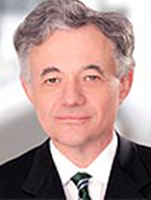"Mens sana in corpore sano"

Around 2000 years ago the Roman poet Juvenal wrote: "A healthy mind in a healthy body". In this saying there is actually a great deal of wisdom. A healthy body is a prerequisite for a healthy mind, meaning that chronic illness and physical limitations will also affect a person's mental abilities.
We carried out an interview on this subject with Prof. Dr. Dr. h.c. Christoph Bode, medical director of the Cardiology and Angiology I at the Heart Center, University of Freiburg. It provides some tips for a healthy lifestyle.
1. What 5 rules of thumb would you give for keeping a healthy heart?
The most important requirement for keeping a healthy heart is definitely not to smoke. Secondly, I would say having normal body weight. Having normal body weight prevents many complications of the heart, metabolism and also the joints.
Independent of these is the third rule of thumb: exercising for 45 minutes every other day, for which athletic sports such as running, swimming and cycling are the most beneficial for the heart. The fourth point I would like to name is a lifestyle with a balanced, healthy relationship between work and leisure. This also includes a full and healthy family life. The last point is that, above a certain age or in case of early onset disease, you have regular check ups with a heart doctor.
2. Do you have a "heart healthy" lifestyle yourself?
Yes, I maintain a fairly healthy lifestyle for my heart. I've never smoked, I have my weight reasonably under control, and I exercise regularly. My wife makes sure that I have enough time to carry on a successful career in medicine, but that in addition I'm a good husband, father, grandfather and also son. Being embedded in my family is very important to the health of my heart, both physically as well as figuratively. My hobby, for nearly a year now, is our first grandchild.
3. "Eat breakfast like an emperor, lunch like a king and dinner like a beggar . . ." What do you think of that saying?
Personally, I only eat one meal a day. I believe that what actually matters is not eating too much in general, and maintaining that for as long as you want to maintain your weight. How you apportion it over the day, I see as not so important. But of course nutritionists can make more competent statements about that.
4. To what extent do controlling weight and stress play a role in a healthy lifestyle?
In terms of controlling weight, a great deal, as we have already determined. Stress per se is not harmful as long as it's positive stress that doesn't lead to depression. Challenges are positive, but excessive demands and in particular chronic overload lead to depression and thus to illnesses.
5. What distinguishes the Heart Center, University of Freiburg? Would you be willing to undergo one of the treatment procedures yourself?
The Heart Center, University of Freiburg is first of all a university-based institution. It follows that forward-looking medicine should be practiced here. At the same time it's a center for teaching and research. In particular, educating students and training new doctors is highly important, ensuring that good patient care is guaranteed in the future. My greatest pride is to have established an excellent cardiological team who can fix any heart problem, if a solution exists anywhere in the world. Therefore, the University Heart Center Freiburg - Bad Krozingen is a care provider that is distinguished by its special excellence.
As for your cross-my-heart-question: yes, if it were necessary, I myself would also undergo the treatments offered at the Heart Center, University of Freiburg.
6. Peering into the distant future: how might the heart medicine of the future look?
We are probably just as incapable of imagining the heart medicine of the future as our medical ancestors 100 years ago were unable to imagine the possibilities today. I can imagine that in 100 years a great deal will be achievable via gene therapy. There will probably also be a vaccine against atherosclerosis and heart attacks. Perhaps we will be able to inject worn heart valve replacements and use magnets to bring them into place, where they will open up and commence their beneficial effects. It's quite clear to me that there will be further progress toward miniaturization and less invasive procedures. I'm also sure there will be further specialization, although the current disciplinary boundaries are likely to play less of a role.
7. When did you last do something good for your heart?
Yes, it was this morning. After my morning exercise, I hugged my wife!
Back